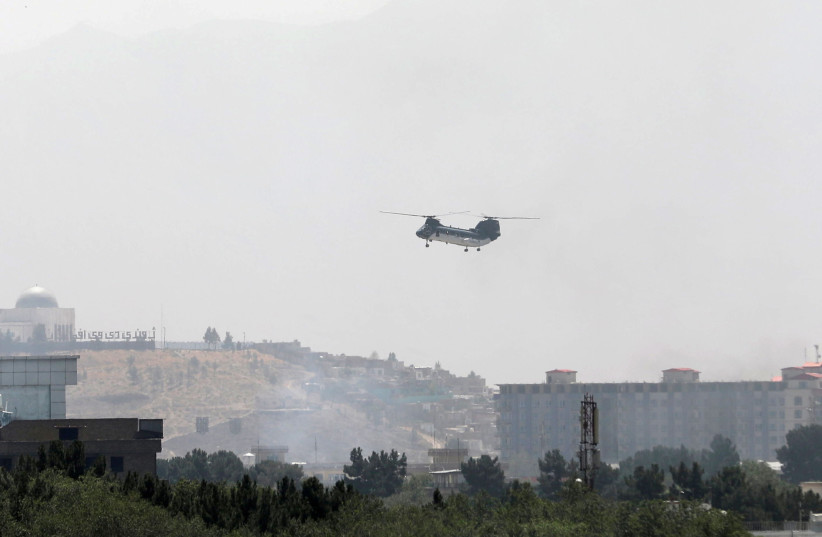The sudden fall of Kabul and Afghanistan to the Taliban weeks or months before even some of the worst-case scenarios predicted can be added to the list of major intelligence failures that have impacted Israel and the US in recent decades.
From the fall of Afghanistan, to at least two wars Israel unintentionally fought with Hamas, to 9/11, to Pearl Harbor and other major events, certain patterns emerge regarding mega-intelligence failures.
Past official reports by intelligence analysts and by external watchdog agencies such as the State Comptroller’s Office have found at least three repeat problems, even with the smartest and most technologically advanced intelligence apparatuses.

Bubble thinking
Like any large institution, Israel’s three major intelligence agencies, and America’s 17 agencies led by the CIA, there is always a problem of even the smartest people falling prey to the same misunderstandings. Whether it is because analysts want to fit in and advance, or whether they simply come to the same conclusions because they are interacting with similar limited data and in a similar bubble-environment, many misses start with this issue.
The law of averages
Most intelligence analysts thrive on moderate predictions. This way, if they are wrong, they are just wrong like everyone else, but not specifically embarrassed as an individual. In contrast, if they make wild predictions that are outside the law of averages and what most analysts are saying, and they are wrong, their career can be wrecked. These incentives discourage bold predictions even when analysts might see a major change over the horizon.
Short-term focus
In most intelligence communities there is a massive amount of immediate and short-term data for forecasting short-term trends day-to-day and month-to-month. Intelligence analysts will often admit that the quantity and nature of this data combined by constant operational questions and requests from the political class lead to emphasizing short-term perspectives over longer-term outlooks. This means that many analysts are less likely to be surprised by missing a day-to-day shift, but are more likely to miss or downplay paradigm shifts that completely undo all of their carefully calibrated short-term models and forecasts.
Politics
Politicians, and sometimes those providing them with intelligence analyses, do not like to be told inconvenient truths. Although US President Joe Biden has a more standard and open process for receiving analysis than his predecessor, Donald Trump, he is still human, and it is quite possible that he pushed formally or informally for rosier predictions in Afghanistan.
WHAT ARE some concrete examples of how these failures played out?
Gaza War 2021
A consistent mountain of Israeli intelligence estimates, supported by nearly seven years of experience, indicated that Hamas would not risk a war with Israel by a rash action such as when it fired rockets on Jerusalem. Based on a backward-looking analysis, this consensus missed that Hamas leaders were growing cumulatively frustrated with having failed to achieve a better economic situation. The analysis also missed that these leaders’ confidence was accumulating that Israel would back down from a broad war as long as Hamas’s rocket fire was short-lived, even if the target, Jerusalem, was provocative.
Gaza War 2014
Similarly to in 2021, nearly three years of reports and experience indicated Hamas was deterred from a broad war with Israel. Once again, the majority of Israeli analysts downplayed the minority analysts’ concerns that the economic situation was so bad that, on a cumulative basis, Hamas might have become so desperate, it would overcome its fear of Israeli retaliation.
Hezbollah and Hamas tunnel threat
Until Hamas successfully ambushed multiple Israeli convoys during the 2014 Gaza War, the IDF treated the tunnel threat as too minor to invest significant funds or energy into overcoming. Only after those embarrassments and multiple years of billions of dollars in investment did the IDF finally succeed at undermining Hamas and Hezbollah’s tunnel asymmetric warfare advantage.
Iraq
False intelligence suggested that the regime had an advanced nuclear program. The administration of George W. Bush overtly intervened in the intelligence-analysis process and cherry-picked details supporting their thesis that Iraq had an advanced nuclear weapons program in order to support their desire to invade. There were many other reasons for why the administration wanted to invade Iraq, but the political interventions in the intelligence process to present the UN and the US Congress with evidence of a serious potential nuclear weapons threat was a big part of what led to the necessary political support for the invasion.
9/11 surprise
A lack of imagination combined with a failure of information-sharing between US intelligence agencies left the US completely exposed to the September 11, 2001, terrorist attack on New York and the Washington, DC, area. A greater readiness for a paradigm shift and taking jihadists public threats more seriously would have left the US better defended and prepared.
Vietnam War defeat
US intelligence at the time did not even remotely consider that the world’s super-power could be defeated by an amateurish and deeply technologically inferior opponent. When progress was not being made, many intelligence officials focused on the number of bombs being dropped on the Vietnamese day-to-day as opposed to whether any strategic change was being achieved.
Pearl Harbor surprise
This is studied as one of the first major failures of the modern intelligence era in which American arrogance simply did not take seriously the possibility that the believed-to-be inferior Japanese would have the audacity to mount a pre-emptive strike against the US naval base in Hawaii. There were warnings from a minority of analysts, but they were quickly dismissed as so unlikely as to border on fantasy.
